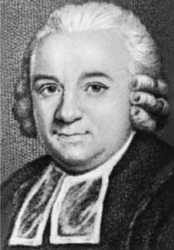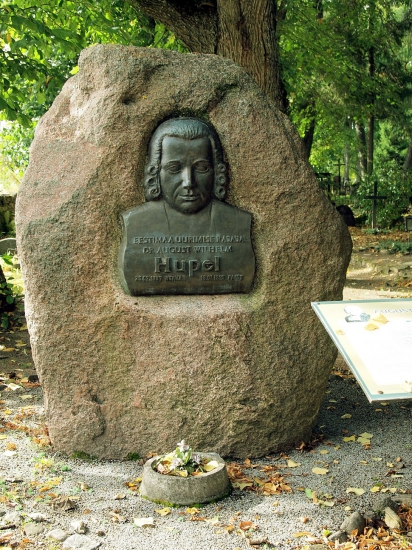August Wilhelm Hupel
25.02.1737 – 18.01.1819
August Wilhelm Hupel (1737 - 1819) - pastor, historian, folklorist and folklore collector. The representative of the Enlightenment, prepared several works for the education of Estonians in Estonian, as well as several editions of scientific discoveries in German. He secured his place in Latvian cultural history as a researcher of historical and folk traditions, as well as a contributor of folk songs to the German philosopher J.G. Herder.
Birth time/place
25.02.1737
Butelštete
Place/time of death
18.01.1819
Paide
Personal information
August Wilhelm Hupel (1737 - 1819) - pastor, historian, folklorist and folklore collector. He was J. G. Herder's associate; in response to his request in 1777, Hupel organized folk songs collection (mostly in Vidzeme), involved local clergy, and other representatives of Baltic German community.
In 1818 he was awarded a doctoral degree in theology.
Professional activity
Literary and linguistic activities
1774 - 1782: 3 volumes of the "Topographische Nachrichten von Lief- und Ehstland" (Topographical news on the Livonian and Estonian lands).The second volume focused on to the customs and traditions of the Latvian and Estonian folk, including music: Hupel described the polyphonic singing, the role of improvisation in folk music, and some musical instruments such as kokle, bagpipes, etc. He prepared the notations of two Latvian folk tunes; one of them is considered to be the oldest published sun-worshiping song tune;
1780: "Ehstnische Sprachlehre für beide Hauptdialekte, den revalschen und den dörptschen; nebst einem vollständingen Wörterbuch" (Estonian language teaching aid for the two main dialects, Revel and Tallinn; complemented by a dictionary). It was printed twice - in Riga in 1780 and in Jelgava in 1818;
1781 - 1798: prepares for publication a series of scholarly and popular scientific articles on the Baltic, its history, geography, anthropology, culture "Nordische Miscellaneen" (1781-1791) - 28 volumes and "Neue Nordische Miscellaneen" (1792-1798) in 18 volumes is follow-up edition.
Folkloristics
1777: Hupel is one of those, who, in response to the German philosopher J.G.Herder's call, organized Latvian folk songs collection, mainly involving local clergy. Having received the texts, he sent them to J.G. Herder to Germany, together with his own collection of Estonian songs, and translated the texts into German. (The collection and description of the folk songs sent to J.G. Herder can be found here.)
Quotes
A.W. Hupel on Latvians and Estonians in "Topographische Nachrichten von Lief- und Ehstland":
"They find a great deal of their entertainment in singing and music. Singing is really a women's task; there are special women to sing at weddings; however, men also step in as soon as the drink makes pleasure absolute In the field, in their games, etc. only girls with shrieks of sings, thus expressing their general satisfaction. Some have good voices and rich natural gifts for singing, but more so among Estonians than Latvians. "
Translated from Berzins L. Greznas dziesmas. Rīga: Zinātne, 2007, pp. 77
Education
1748–1754
Veimāras klasiskā ģimnāzija
Veimāras klasiskā ģimnāzija
Iestājies uzreiz ģimnāzijas 2. klasē.
1754–1757
Friedrich-Schiller-University Jena
Jēna
Studēja teoloģiju, matemātiku un dabaszinātnes.
Working place
1757–1760
Rīga
Mājskolotājs
1760–1763
Ķipēnu muiža
Bijis mācītājs Ķipēnos.
1763–1804
Lutheran congregation in Põltsamaa
Peltsamas Sv. Nikolaja luterāņu baznīca
1804–1819
Paides evanģēliski luteriskā draudze
Paides Svētā krusta baznīca
Memorials
2012
Reopalu kapsēta
Kapavietā izvietots piemineklis
Buried
1782
Reopalu kapsēta

